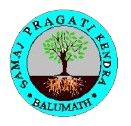
~ VILLAGE ENTREPRENEURSHIP ~
Economic development is the most desired factor of every tribal either an individual or community. Entrepreneurship at large scale or rural small business at local level plays pivotal role in accelerating economy, generating employment, eradication of poverty and use of natural resources for the economic development of the family and community. Market is the center of exchange of money, material, and resources, Skill, knowledge and power. Basic traits of entrepreneurs are ‘need for motive’, risk taking capacity, locating business opportunities, able to accumulate resources, knowledge of marketing and services, skills for producing the product, leader and managerial skills to build an organization, ability to organize and quick to responding to environment and market demand.
In spite of rich natural resources e.g. minerals, forest produces, agriculture product, herbal, handicrafts, tourism, available opportunities, market facilities etc. Jharkhand being the habitats of tribals is the 27 th poorest state in the country. This is a challenging situation for developers, politicians and economists. People live in deprivations, extreme poverty, trafficking, migration, exploitation, infiltrated by non tribals in the state etc. few indicators of non- entrepreneurs’ tribal communities.
Interventions Strategy:
Woman participants are identified who are under BPL and live under Rs. 200 per day. Have no prior business experience and are unable to provide basic needs of the family. Their poverty level is assessed through a community based Participatory Wealth Ranking and Poverty Probability Index (PPI)
Training:
Participants are trained on business skills and financial literacy designed for new business candidate who have little formal education and assist them in building sustainable small business of three budding entrepreneurs each. Integrated resource sustainability training ensures that new business activities promote environmental best practices and the family support module inviting the whole household ensures program participants, mostly women are supported while participating in our program. Some goal-setting tools enable to standardize content for each mentoring visit and make sure every business owner receives proper training.
Business Saving groups:
At the beginning of the training, Business Savings Groups (BSGs) are formed of approximately 10 businesses (10 X 3=30 entrepreneurs) each. BSGs are a self-generating, self-managed form of microfinance that allows members to pool savings and access loans. BSGs provide members with ongoing protection against financial risks and access to growth capital. Business Savings Groups serve as a safety net and a support group, as well as our exit strategy.
Seed Capital:
The organization supports to find seed capital to start the business after the business group develops a business plan with the help of their business mentor. After assessment by the business mentor additional training and inputs are provided to the successful entrepreneurs.
Mentoring:
Mentroing is the important task of the organization. The deputed Business mentors guide each new group in selecting an enterprise that is best positioned to flourish, taking into account the team’s skill set, local market conditions, risk factors, and profitability. Equipped with mobile training and mentoring tools, business mentors provide important ongoing coaching and mentoring throughout the program to ensure that all participants have the skills and knowledge to run a business, save for the future, resolve group conflicts, develop confidence and agency, and successfully graduate out of extreme poverty.
